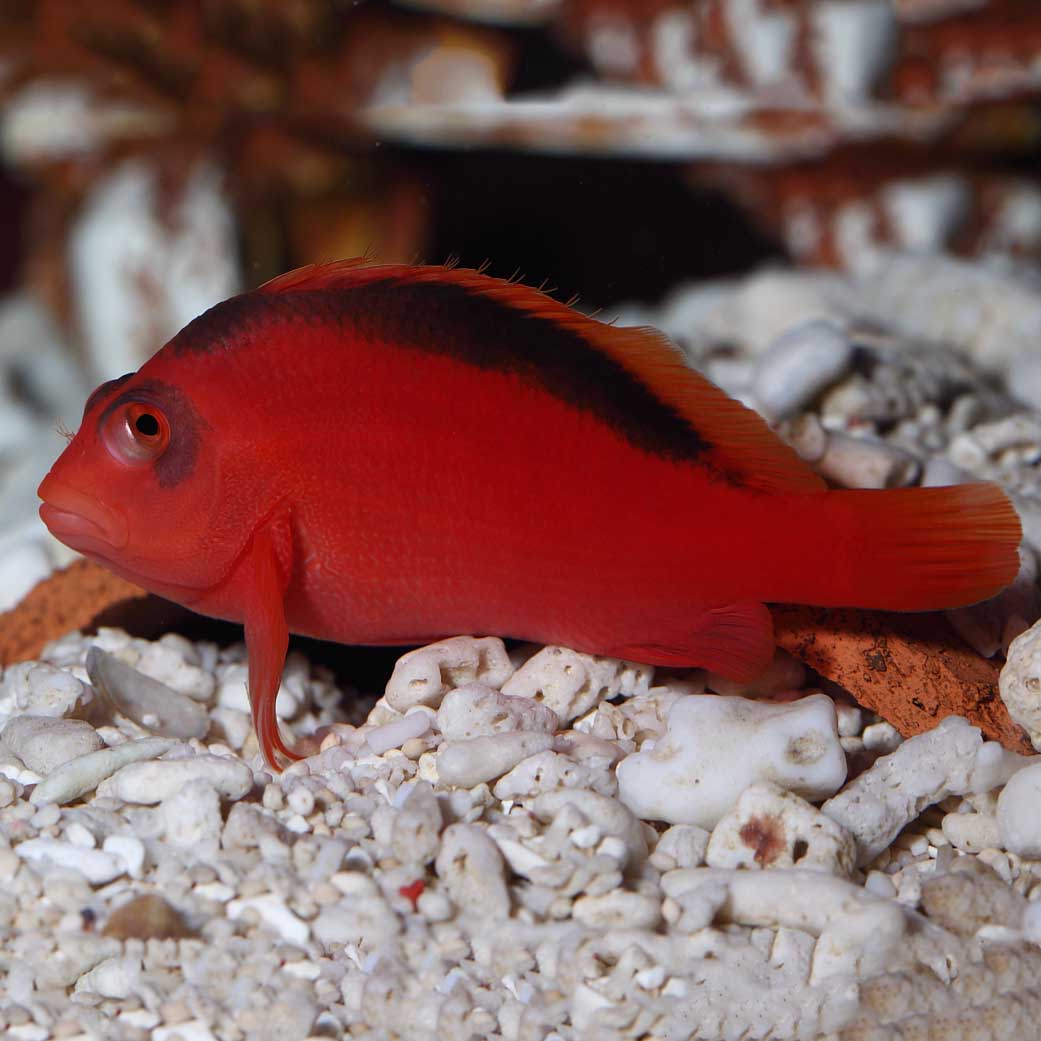The Scarlet Hawkfish (Neocirrhitus armatus) is a beautiful and vibrant fish with a maximum size of around 6 inches (15 centimetres). It has a slender body and a distinctly elongated snout. As the name suggests, the fish is bright red and adorned with bold black markings. The dorsal fin is tall and pointed, giving it an elegant appearance.
Taxonomy:
The Scarlet Hawkfish belongs to the family Cirrhitidae, which consists of various species of hawkfishes. Its scientific name is Neocirrhitus armatus.
Natural Habitat:
In the wild, the Scarlet Hawkfish inhabits coral reefs and rocky areas with ample hiding spots. It seeks refuge within crevices or perches on coral branches, using its pectoral fins to prop itself up. This species prefers warm tropical waters and can be found in the Indo-Pacific region.
Keeping Scarlet Hawkfish Healthy:
The Scarlet Hawkfish requires moderate care and is suitable for intermediate to advanced aquarists. It prefers stable water parameters and pristine water quality. Regular monitoring of ammonia, nitrite, nitrate levels, as well as temperature and salinity, is necessary. A well-maintained protein skimmer and a reliable filtration system are recommended to keep the tank environment optimal.
Special Requirements and Feeding:
This hawkfish is a carnivorous species that feeds on small invertebrates, crustaceans, and fish in the wild. In an aquarium, it can be fed a varied diet consisting of live or frozen meaty foods such as brine shrimp, mysis shrimp, and chopped fish. Offering a mix of different food sources ensures proper nutrition.
How Many Should I Keep?
It is best to keep the Scarlet Hawkfish as a solitary specimen or in a mated pair. They may become territorial towards their own species or similar-looking fish, so providing ample space and hiding spots is important.
Lighting Preference:
The Scarlet Hawkfish can adapt to a wide range of lighting conditions, but it generally thrives under moderate to bright lighting in the aquarium.
Suitable Tank Mates:
Compatible tank mates for the Scarlet Hawkfish include peaceful reef fish species that are not overly territorial or aggressive. However, caution should be exercised when selecting tank mates, as they may prey on smaller ornamental shrimp and other invertebrates.
Reproduction in the Wild:
During the reproductive season, Scarlet Hawkfish (Neocirrhitus armatus) engage in courtship behaviours and release eggs and sperm into the water column for external fertilization. The specific details of their reproductive behaviour in the wild are not extensively documented.
Breeding Neocirrhitus armatus:
- Set up:
Breeding Scarlet Hawkfish in a home aquarium requires careful planning and preparation. A spacious and well-maintained reef aquarium with appropriate hiding spots is essential. The water parameters should be stable, with a temperature range of 75-80°F (24-27°C) and a pH range of 8.1-8.4.
- Courtship/Spawning:
To encourage courtship and spawning, a bonded pair of Scarlet Hawkfish should be introduced to the breeding tank. Courtship behaviours may involve elaborate displays, fin movements, and colour changes. The female will release her eggs while the male releases his sperm to fertilize them in the water column.
- Rearing:
After spawning, it is crucial to remove the eggs from the breeding tank to a separate rearing system. The eggs are typically adhesive and will attach to a substrate. The rearing system should provide appropriate water flow, temperature, and lighting conditions to support the development of the eggs.
Sexual Dimorphism:
Sexual dimorphism in Scarlet Hawkfish is not well-documented, but males and females may exhibit subtle differences in size or colouration. However, it can be challenging to visually distinguish between the sexes.
Distribution:
The Scarlet Hawkfish, Neocirrhitus armatus, is naturally distributed in the Indo-Pacific region, including the Indian Ocean, the Red Sea, and the western Pacific Ocean. It is not typically available as a captive-bred or line-bred strain.
Summary:
The Scarlet Hawkfish (Neocirrhitus armatus) is a vibrant and captivating fish species with a distinctive appearance. Its care level requires attention to water quality, suitable tank mates, and a proper diet. While its reproductive behaviour in the wild is not extensively documented, breeding Scarlet Hawkfish in a home aquarium can be achieved by providing the appropriate setup, encouraging courtship and spawning, and providing a separate rearing system for the eggs. This species is native to the Indo-Pacific region and is not commonly available as a captive-bred strain. The Scarlet Hawkfish can be a beautiful addition to a well-maintained reef aquarium, but its care should be considered intermediate to advanced due to its specific requirements and delicate nature.





Reviews
There are no reviews yet.